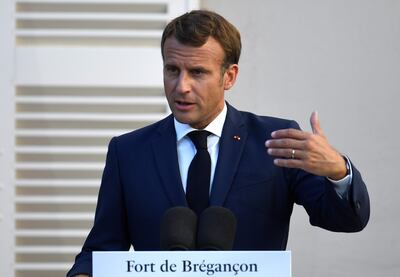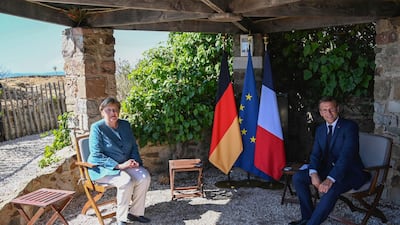German Chancellor Angela Merkel and French President Emmanuel Macron said they would assert European sovereignty and the rule of international law in the Eastern Mediterranean after their talks in southern France.
At his summer retreat after meetings with Mrs Merkel, Mr Macron said they wished to show their solidarity with Greece and Cyprus while continuing talks on growing tension caused by Turkey's exploratory drilling in the area.
He has been pushing for Brussels to take a stronger line on Ankara, particularly in the Eastern Mediterranean. In a tweet after the discussions, Mr Macron also targeted another aspect of Turkey's regional activities when he demanded new rigour from the European naval coalition that is patrolling the seas off Libya. The Irini mission was launched to intercept shipments of weapons bound for Libya.
Germany's navy, along with France, Italy and Greece, is a direct participant in the Irini naval mission to uphold the UN Security Council resolutions 1970 and 2292 prohibiting arms shipments to Tripoli. Turkey has used the sea lanes across the Mediterranean to supply its allies in western Libya with both an arsenal of weapons and personnel recruited from extremist battalions from the Syrian conflict.
Earlier this month France also boosted its military presence in eastern Mediterranean region amid flaring tension between Athens and Ankara after a Turkish seismic research vessel, the Oruc Reis, was sent into waters off eastern Greek islands.

Mrs Merkel said it was important that Europe spoke with one voice about the Eastern Mediterranean while seeking a multilateral solution to the dispute.
"We need stability there and not tension," she said. "We have a very critical situation.
"I am convinced that if Germany and France join forces here, we will find good solutions that will hopefully make co-operation possible, but that will also make clear we will not accept attacks on the sovereignty of member states of the European Union.
"We are in favour of solving problems through discussion and not by escalating tensions, and that applies to all parties involved.”
Mrs Merkel was the first German chancellor to the visit Fort de Bregancon in the south of France since her country’s reunification.
She was greeted on arrival by Mr Macron and his wife, Brigitte, who exchanged bows instead of handshakes.
"The best place in the world," Mrs Merkel told her hosts in English as they pointed out the features of the fortress.
They then put on surgical masks and went inside to start their talks.

Mrs Merkel has become the principal mediator between Turkey and Greece, which along with Cyprus has borne the brunt of Turkey’s aggression.
At least once in July she was forced to intervene at the 11th hour to stop a direct confrontation between Greek and Turkish naval ships.
Before the meeting, in an interview with the French news magazine Paris Match, Mr Macron railed against Turkish President Recep Tayyip Erdogan.
He said Mr Erdogan was pursuing “an expansionist policy that mixes nationalism and Islam, which is incompatible with European interests".
Paris has sought punitive action against Ankara since June, when it said its navy ship, the Courbet, was harassed by Turkish warships as it tried to inspect a Tanzanian-flagged cargo ship suspected of being used by Turkey to flout the EU's arms embargo on Libya.
Despite rebukes from the Brussels over its actions in the Eastern Mediterranean and calls for sanctions from Greece, Turkey has sent a second drilling ship, the Yavuz, into Cypriot waters.
Meanwhile, Nicosia has accused the EU of appeasing Turkey by failing to introduce sanctions.
EU foreign ministers will meet to discuss possible sanctions against Turkey at the end of next week.
On Wednesday night, after a meeting of EU leaders, Mrs Merkel called for dialogue and restraint while asserting support for Greece and Cyprus.

